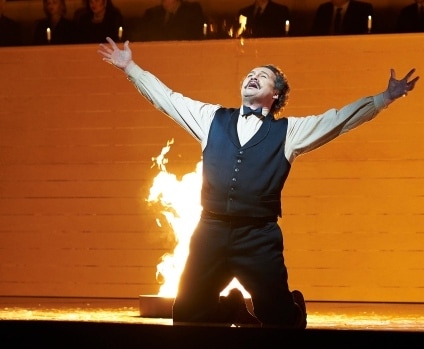 Russell Braun as Louis Riel Photo: Michael Cooper.
Russell Braun as Louis Riel Photo: Michael Cooper. The Canadian Opera Company rarely stages Canadian operas. And with the current production of Louis Riel, which opened April 20 at Toronto’s Four Seasons Centre, Canada’s largest opera company did something not just rare but virtually unprecedented: It remounted a Canadian opera written half a century ago.
So who was Louis Riel? Any student of Canadian history can tell you he was a leader of the Métis – people of mixed French and Native ancestry – in Western Canada, in the late 19th century. He is remembered (fondly by some, not so fondly by others) for his resistance to the authority of the Canadian government, leading armed rebellions in 1869 and 1884. In choosing Riel as their subject, Somers and Moore hit on an opera-ready topic full of dramatic incidents that’s so Canadian it bleeds maple syrup. (The music is a different matter, however; we’ll get to that.)
As the COC has astutely realized, much has changed since 1967. Back then, nobody in the opera world thought there was anything amiss in commissioning a couple of white men to write an opera that presented Native history and culture or of staging it with white opera singers in brown-face makeup. Nowadays, with increased concern and sensitivity around “cultural appropriation,” the company realized it could give offence with Louis Riel.
The COC has pointedly involved Native and Métis Canadians in the production: Stage director Peter Hinton included a silent “Land Assembly” of indigenous people who occupy the stage throughout the opera; and before the opening curtain, a statement of “territorial land acknowledgement” was read. The supertitles are trilingual: English, French, and Michif, a Métis language.
Like any good historical opera, Louis Riel plays fast and loose with history. The opera begins with Riel establishing a provisional government in (what is now) Manitoba and then resisting Canada’s efforts to establish its authority there. From the moment baritone Russell Braun stepped on stage as Riel, he inhabited the character entirely, portraying a man governed by responsibility to his community, his deep Catholic faith, and (as the opera progresses) a tenuous grasp on reality.
Riel’s political rival is Sir John A. MacDonald, Canada’s first prime minister. In the hands of baritone James Westman, MacDonald is a buffoonish but wily politician, cynical and entirely self-serving. (Costume designer Gillian Gallow underscored his clownishness by dressing him in a ridiculous tartan suit.) Trying to bridge the gap between Riel and MacDonald is Bishop Taché, sung with sonorous religiosity by bass Alain Coulombe.
While Louis Riel is an opera dominated by men, there are two notable female roles: mezzo-soprano Allyson McHardy fleshed out Riel’s mother, Julie, with heartfelt intensity; and soprano Simone Osborne offered a haunting rendition of the lullaby “Kuyas” (“Long ago”), in the Cree language.
From beginning to end, Louis Riel is a dramatically tense piece, bursting with more conflicts than one might imagine could be crammed into a single opera: English vs. French, English vs. Irish, White vs. Native, Catholic vs. Protestant, and British Imperialism vs. American Manifest Destiny. Things do not end well for Riel. In the last scene, he is hanged for treason – and there the opera abruptly ends.
The tension of the libretto is well reflected in Somers’ multifaceted score. Mostly, this music is harsh, angular, dissonant, and proudly atonal, and there are whole passages that could be mistaken for something by Alban Berg, although Somers uses more percussion. That said, there are also tonal elements – including a 19th-century-style marching band that accompanies a chorus of angry Ontario Orangemen – that come off as willful intrusions. From the pit, music director Johannes Debus and the COC Orchestra emphasized all of this, making the most of every garish and disjunct moment the score has to offer.
Louis Riel is very much a product of its time, written by a 20th-century Paris-educated composer who was well schooled in the techniques of European modernism. The result is a kind of Wozzeck on the Prairies, complete with a harrowing mad scene in which Riel has a mystical vision and declares himself a prophet.
But is all this angst-ridden modernism the most appropriate musical style for the place and time in which Louis Riel is set? Is there much about the way this opera sounds that evokes Canada, then or now? I’ve never been convinced that there is, and this production, for all its committed effort, has not won me over on that point. That said, there’s no denying that despite its jarring, audience-unfriendly score, Louis Riel has carved out a place for itself in Canada’s operatic life.
© Colin Eatock 2017
 RSS Feed
RSS Feed

